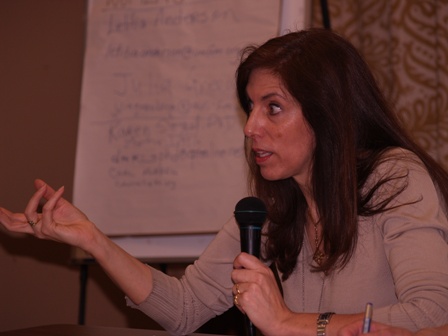 Delegates at the 53rd Session of the UN’s Commission on the Status of Women are confirming what rural women themselves know all too well, the already disadvantaged poor and rural women are hardest hit by the current global economic crisis.
Delegates at the 53rd Session of the UN’s Commission on the Status of Women are confirming what rural women themselves know all too well, the already disadvantaged poor and rural women are hardest hit by the current global economic crisis.
The crisis is reinforcing existing gender and class inequalities, with women facing more retrenchments and cut backs in public spending and financing. In particular, rural women farmers face the toughest challenge yet, with ever-increasing costs of basic commodities. It is not just women in the developing world that are bearing the brunt. According to Rural Development Leadership Network’s Shirley Williams-McClain, women in developed countries such as the United States are equally vulnerable.
“In talking to rural women in my state, and from my own observation, this current financial crisis is devastating. Poor rural women in my state feel very vulnerable. They make the least amount of money and yet have to pay the higher prices for gas, oil electricity, food transportation, housing, and healthcare.” The Food and Agricultural Organisation (FAO) says that the crisis’s impact will have serious ramifications on agriculture and food security, as it is affecting the world’s most productive labour force.
Statistics show that rural women are net food producers all over the world. According to the Women’s World Summit Foundation, rural women produce more than half of the food that is grown – up to 80% in Africa, 60% in Asia, and between 30-40% in Latin and North America. The flipside, however, is that women do not have access to the land they need to produce, and the access to the credit they need to fund production. FAO’s Director for Rural Economic and Social Development, Marcela Villareal revealed in one session that women only owned about 2% of the land they work on, and receive only 1% of all agricultural financing.
Thus, while women are the mainstay of agricultural production, the unequal and highly gendered distribution of land means that they will find it even more difficult than men to gain access to credit and to agricultural inputs, technology, extension, training and services that would enhance their production capacity. However, it was not all doom and gloom – other participants saw the current crash as an opportunity to revamp a system that ‘has always been broken’ – an opportunity in disguise of sorts to reconstruct a more inclusive global financial system.
‘Would you agree with me that the financial has always been broken? It did not work well for women like me and many of you in the past so maybe we can help reconstruct something that works for all people. There exists an opportunity for us as rural women to improve our situation. The current financial crisis may even offer a chance to create new models of exchange and leadership,’ said Williams-McClain. One practical way of doing this, is put more women in decision making positions:
‘We must have rural women at the table to make policies at the local, state, national and international levels. When we are at the table, we can develop policies to create more wages for similar work, gain compensation for home healthcare, childcare and eldercare. If women were on more policy boards we would be more powerful to help ourselves. We must improve literacy and financial literacy for rural women,’ she said.
Asked of her perspectives of the crisis, Anita LaRan quipped: ‘Financial crisis? What financial crisis? Haven’t we always done the best we can with what we have? US rural women are always in a financial crisis, day in, day out. They are only talking of a financial crisis because it has hit Wall Street and the wealthy!’
LaRan is in charge of the Sangre de Cristo Livestock Growers Asasociation (LGA), which supports rural women in Northern New Mexico to run small livestock ranching projects.
To date, LGA has managed to link the poor Hispanic communities in the area with the Heifer International Foundation, which has donated breeding livestock to 22 families for small- to medium-sized organically-grown beef projects. Although still far from achieving its targets, the project has scored some small successes, mainly through improving the self-sustainability of the impoverished community. ‘Families are starting to look at their farm or ranch not just as a family tradition, but also as a profit centre,’ revealed LaRan.
However, small women farmers from New Mexico still face many obstacles, chief among them being bureaucracy, and strict barriers to entry into the urban markets. LaRan said that even though there is an ever increasing demand for naturally grown beef and mutton, the women still face tough resistance from the bigger slaughterhouses (abattoirs) and licensing officials.
She, however, argued that it is the spirit of self-reliability of the women the world over that will enable them to survive the current crisis: ‘Maybe, just maybe, this is our opportunity to show the true strengths of rural communities, as we are the backbone of the world. Let us use this as an opportunity to build our communities and build on services to take care of our constituents.’
Story by Fortune Sibanda, a Network Manager at GEMSA. This article is part of the GL Opinion and Commentary Service, which offers fresh news on every day news. From Citizen Journalism in Africa.